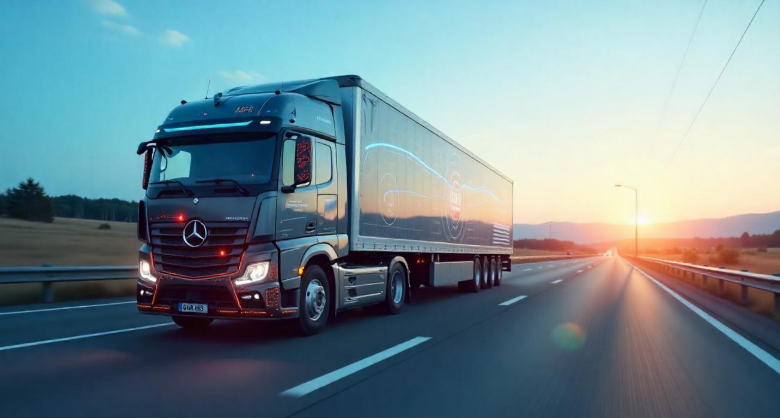Understanding the Technology Behind Trailer Transport Services: GPS Tracking and More

In today’s fast-paced and technology-driven logistics world, trailer transport services are undergoing a massive transformation. What was once a manual and often opaque process has now evolved into a high-tech, transparent, and highly efficient system — thanks to the integration of cutting-edge technologies like GPS tracking, telematics, IoT sensors, and automated dispatch systems.
What is in Article?
- Modern trailer transport leverages GPS tracking for real-time visibility, telematics for data-driven fleet management, and IoT sensors for cargo monitoring, enhancing efficiency and safety.
- Electronic Logging Devices (ELDs) ensure driver compliance and safety, while route optimization and automated dispatch systems streamline operations and reduce costs.
- Cloud-based platforms and customer-facing technologies provide transparency, improve communication, and ultimately enhance customer satisfaction in trailer transport services.
This article takes a closer look at the technologies powering modern trailer transport services and how they are improving reliability, safety, and customer satisfaction.
See also: Why Tech Firms Need Somali Translation Services
The Importance of Technology in Trailer Transport
Transporting trailers — whether for commercial freight, RVs, or heavy equipment — involves more than just moving a load from Point A to Point B. Fleet managers, transport companies, and customers now expect real-time visibility, precise delivery windows, enhanced safety protocols, and data-driven insights. This is only possible through advanced technological integration.
Let’s explore the core technologies making this possible.
1. GPS Tracking Systems: Real-Time Visibility
Image Credit Goes to FreePik
Global Positioning System (GPS) technology has revolutionized trailer transport services by offering:
- Live Tracking: Fleet managers and customers can track the exact location of their trailers in real time.
- Geofencing: Alerts are triggered when a trailer enters or exits a predefined area.
- ETA Accuracy: Real-time traffic and route optimization help provide more accurate estimated time of arrivals.
Benefits of GPS Tracking:
- Minimizes theft and unauthorized use
- Improves dispatch efficiency
- Enhances transparency for customers
2. Telematics: Data-Driven Fleet Management
Telematics is the fusion of telecommunications and informatics. It enables the monitoring of:
- Vehicle speed
- Driver behavior
- Fuel consumption
- Engine diagnostics
With telematics, transport companies can reduce fuel costs, prevent mechanical breakdowns, and ensure driver compliance with safety regulations.
Key Advantage: Proactive maintenance alerts help prevent costly delays.
3. IoT Sensors: Smart Monitoring
Internet of Things (IoT) sensors are embedded within trailers to monitor various conditions such as:
- Temperature (for perishable goods)
- Load stability
- Door status (open or closed)
- Tire pressure
This real-time monitoring ensures cargo safety and regulatory compliance, especially in industries like food, pharmaceuticals, and electronics.
If you’re working with a trailer transport company that integrates IoT technology, you gain valuable insights into cargo health and trailer conditions during transit — helping reduce risks and improve overall shipping outcomes.
4. Electronic Logging Devices (ELDs)
The ELD automatically records the operating times of the driver, exchanges paper protocols, and reduces the risk of errors.
ELDs help to:
- Prevent driver fatigue
- Maintain legal compliance
- Reduce accident risk
- Ensure smooth inspection processes
These devices are now a legal requirement in many regions and are essential to modern trailer transport operations.
5. Route Optimization Software
Route optimization tools use advanced algorithms and real-time data to:
- Avoid traffic congestion
- Minimize fuel consumption
- Adapt quickly to road closures, weather changes, or detours
With artificial intelligence (AI)-powered logistics software, dispatchers can assign loads more efficiently and cut operational costs.
6. Automated Dispatch and Communication Systems
Today’s dispatch systems allow:
- Intelligent load adjustment based on driver and trailer availability
- Real-time communication with drivers via mobile apps
- Instant updates for customers and fleet managers
These systems reduce human error, increase delivery speed, and improve customer satisfaction.
7. Cloud-Based Fleet Management Platforms
Image Credit Goes to FreePik
With cloud technology, all data — from GPS tracking to vehicle diagnostics — is centralized and accessible from anywhere.
Benefits include:
- Scalable fleet monitoring
- Remote diagnostics and troubleshooting
- Easy integration with mobile and desktop apps
- Historical route analysis and performance metrics
8. Security Technology: Surveillance and Anti-Theft Features
Trailer security is enhanced with:
- Rear-view and cargo compartment cameras
- Smart locks and access control systems
- Vibration and intrusion detection sensors
- Emergency alerts for unauthorized access
These features are especially vital when transporting high-value or sensitive cargo.
9. Customer-Facing Technology
Modern trailer transport service providers now offer:
- Live tracking portals for transparency
- Digital documentation and e-signatures for convenience
- Real-time notifications for ETA, delivery, or delays
- Integrated support chat or ticketing systems
This tech enhances customer experience and builds trust in service providers.
10. Common Challenges Solved by Technology
| Challenge | Technology Solution |
| Theft or unauthorized access | GPS tracking, geofencing, smart locks |
| Delivery delays | Route optimization, live traffic data |
| Driver fatigue | Electronic Logging Devices (ELDs) |
| Cargo spoilage/damage | IoT sensors (temperature, motion) |
| Poor visibility and tracking | Real-time GPS and cloud dashboards |
11. Real-World Example: Technology in Action
Midwest fleet equipped with GPS, telematics and IoT sensors based in logistics companies. As a result:
- Fuel usage dropped by 18%
- On-time deliveries improved by 22%
- Customer complaints decreased due to better transparency
This transformation allowed the company to grow its client base and reduce operational costs. For residential or commercial moves, tech-enabled Furniture Shipping Florida services ensure your items are tracked, secure, and delivered with precision.
12. Tips for Choosing a Tech-Enabled Trailer Transport Service
If you’re looking for a reliable, high-tech trailer transport service provider, consider the following:
- Do they offer real-time GPS tracking for your trailer?
- Are IoT sensors used for sensitive cargo monitoring?
- Is their dispatch system automated and efficient?
- Do they comply with ELD and HOS regulations?
- Can you access digital invoices, e-signatures, and live updates?
Asking the right questions ensures you’re getting modern, safe, and reliable service.
Conclusion:
As demand for efficient and secure trailer transport services grows, technology continues to play a crucial role in shaping the future of logistics. From GPS tracking to IoT sensors and AI-driven route optimization, today’s transport companies have powerful tools to deliver faster, safer, and more reliable service.
Whether you’re a business owner shipping equipment or a fleet manager handling large-scale operations, understanding these technological advancements can help you make informed, cost-effective decisions — and stay ahead in a competitive industry.
Frequently Asked Questions (FAQs)
- How does GPS tracking help trailer transport services?
GPS provides real-time location updates, accurate ETAs, and reduces the risk of theft or delays through geofencing and route monitoring. - What are ELDs and why are they important?
ELDs (Electronic Logging Devices) automatically track a driver’s hours of service to ensure compliance with regulations and reduce fatigue-related accidents. - What is the role of IoT in trailer monitoring?
IoT sensors monitor key cargo conditions (like temperature or shock), ensuring safety and preventing spoilage or damage during transit. - Can I monitor my shipment during transport?
Yes. Many providers offer customer portals or mobile apps where you can track your trailer, communicate with support, and receive updates.




